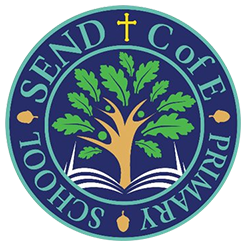Early Years Foundation Stage
We recognise that the Early Years Foundation Stage (EYFS) is a distinct phase of education for children, with its own distinct identity. It is fundamental in providing an essential base, both academically and socially, for a child’s education. At Send CofE the Early Years Foundation Stage covers our Nursery and Year Reception classes.
What is it like to be a learner in our EYFS?
Our Vision Statement states that 'Childhood matters to us: it is short, precious and cannot be repeated'. We recognise that the Early Years underpins all the future learning that children will encounter. Children not only learn new academic knowledge, they learn how to be learners and how to be in a community with others.
We value and harness the innate curiosity of this stage of childhood to inspire learning:
- We recognise that children in the EYFS learn through a careful balance of play and direct experiences, through exploring and being active, and through creative and critical thinking which takes place both indoors and outside.
- We prioritise high quality interactions with adult focussed activities where appropriate.
- Our children guide and drive their own learning through carefully resourced continuous provision with enhancements to aid the development of skills and knowledge.
- Children are active participants in their learning, acquiring new knowledge and skills, developing their thinking, taking and managing risks and working independently and in groups.
- We encourage independence of thought and choice of activity throughout the EYFS, as we believe this allows children to develop the skills that they need to become successful learners and to reach their full potential.
- The activities provided for our learners are play-based wherever possible, however there is also a need for some direct teacher-led activities to ensure all children gain essential knowledge and skills. Priority is given to providing sufficient sustained periods of play with support and resources to allow children to repeat and deepen their taught skill development.
We have crafted an ambitious curriculum which meets the needs of our children:
- Our EYFS Curriculum is designed to reflect the interests and needs of our children.
- It is bespoke to our school and inspiring for all learners.
- It is designed to be responsive to the needs of our children, families and community.
- Our ambitious Early Years curriculum aims to teach all children the skills and knowledge in order that they reach the seventeen Early Learning Goals described in the Early Years Foundation Stage framework.Our curriculum is developed to prioritise sequential, progressional learning, where pupils know more and can do more, building on what they have been previously taught.
- When appropriate, activities are expertly modelled using Rosenshine's 10 principles of instruction (I do, we do, you do).
- Each topic planned, is individually tailored to our children each year, with the aim of ensuring that all children leaving Reception are ready to start the KS1 curriculum. Topics do not always last a specific amount of time but are developed based on the children’s learning at the time and the related core knowledge and skills which need to be taught.
- All topics are carefully resourced and where possible are introduced with a high quality, diverse story book or age appropriate non – fiction text that reflects the interests and experiences of our children.
Our staff support children's learning and development at all levels:
- We use Birth to Five Matters as a rich resource to support our knowledge of child development and as a supporting document for our curriculum.
- Our staff are highly skilled and confident with assessing necessary starting points based on quality interactions.
- Staff know the children well and quickly recognise those who will need early intervention due to entering our setting with low starting points.
- They monitor who is and is not on track regularly, put in timely catch-up sessions and tailor future planning to provide more opportunities for skill development and progress.
